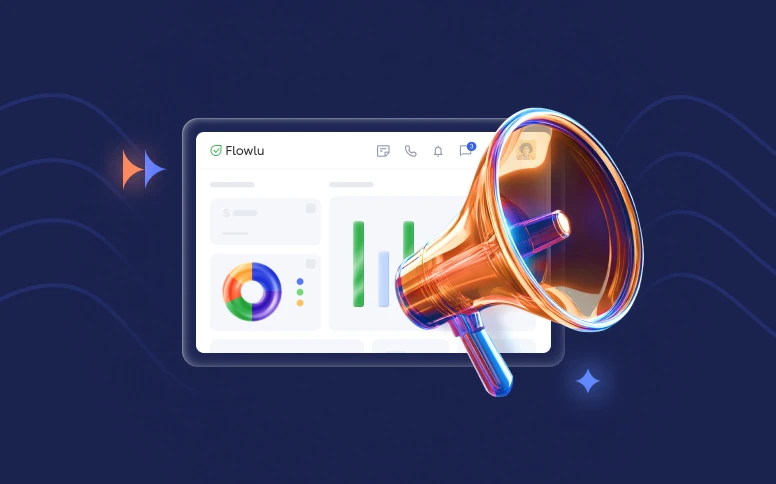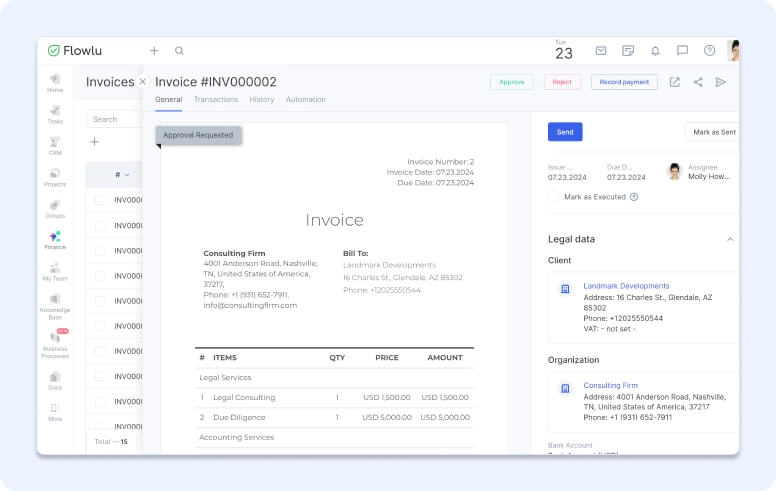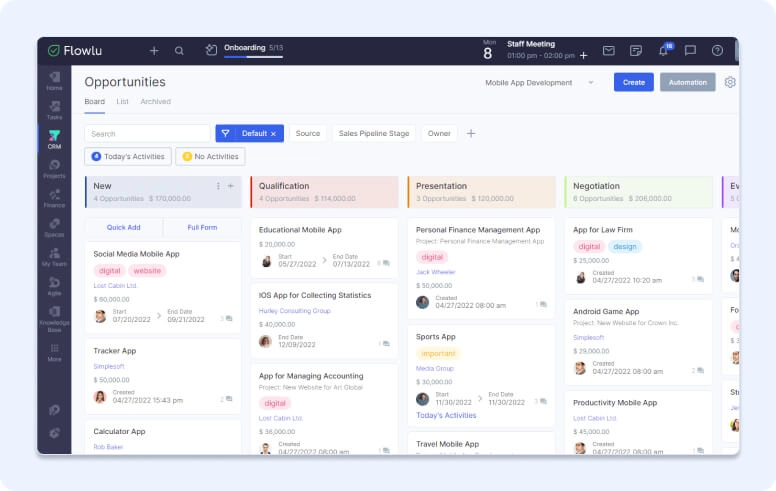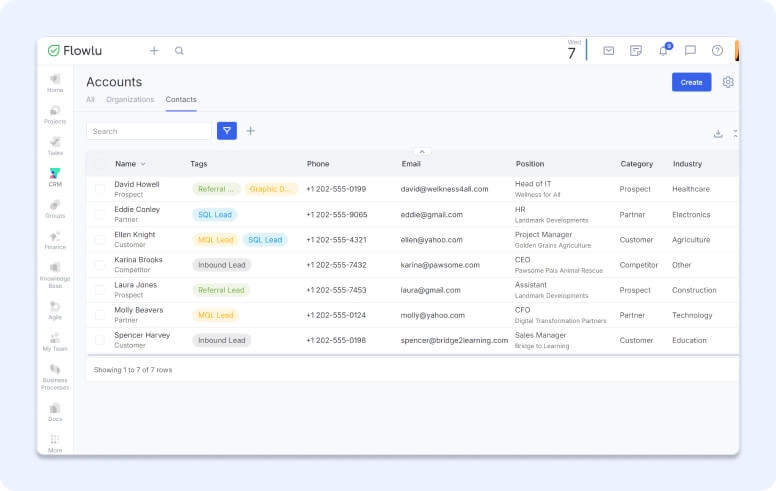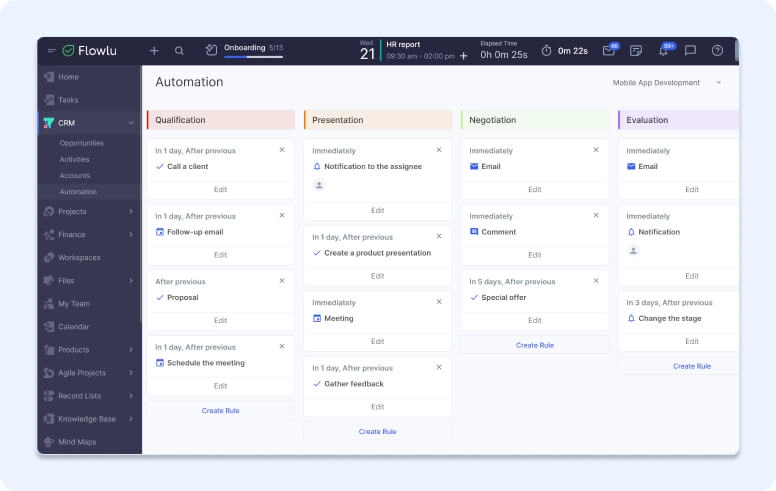CRM and Marketing Automation: Why SMBs Should Use It
- What Is CRM Automation and Why Use It?
- Benefits of CRM Automation
- Key Functions of CRM Automation
- CRM Automation vs. Marketing Automation
- What Does Marketing Automation Do?
- Why Combine CRM and Marketing Automation?
- How to Set Up CRM and Marketing Automation
- CRM and Marketing Automation Best Practices
- Conclusion
The solution? CRM and marketing automation.
These tools are no longer just for the big players in the industry. CRM and marketing automation can be the key to streamlining tasks, nurturing leads, and building rock-solid customer connections for a business like yours.
Ready to optimize your efforts without the constant scramble?
In this article, you’ll learn everything you need to know about CRM and marketing automation.
What Is CRM Automation and Why Use It?
Customer Relationship Management (CRM) automation is all about using technology to streamline and automate various tasks involved in managing customer interactions, data, and relationships. This can include everything from data entry and lead management to customer interactions, follow-ups and sales forecasting.
Now, why should SMBs use CRM automation? The answer is simple: efficiency and effectiveness.
Whether you run your business alone or with a few employees, implementing CRM automation shows that you are focused on growing your business.
CRM automation helps businesses grow by improving employee well-being, ensuring efficiency in processes, and providing better customer experiences.
Benefits of CRM Automation
Let’s break down how exactly CRM automation can help your small business:
-
Increased efficiency: Automating repetitive tasks such as data entry and sending follow-up reminders enables businesses to free up valuable time and resources. This allows employees to focus on more strategic and revenue-generating tasks.
-
Improved collaboration: CRM automation provides a centralized database for storing customer information, ensuring that teams across departments are working together. This enhanced collaboration fosters better communication, leading to a more cohesive and coordinated approach to customer management.
-
Enhanced customer satisfaction: Implementing automated CRM features like email follow-ups and reminders can make your customers feel valued and cared for. CRM tools can help businesses provide a seamless customer experience, respond to inquiries and requests more promptly, personalize interactions, and deliver consistent and high-quality service across all touchpoints.
-
Better lead generation and conversion: With CRM automation, businesses can automatically capture and track leads from various sources, such as website forms. Then, they can score and nurture high-potential leads through automated workflows and targeted communications.
-
Data-driven decision-making: 92% of small and medium-sized business teams are already leveraging CRM tools to capture and analyze customer data. Using insights from customer behavior, preferences, and buying patterns, businesses can update/upgrade their products and services or tailor their strategies to suit customer needs and preferences.
-
Increased profitability: CRM automation helps lower operational costs by streamlining operations and reducing manual workload. With higher efficiency, better lead conversions, and improved customer satisfaction, SMBs can achieve higher revenue and profitability.
With CRM automation, the possibilities are endless. Settling for the traditional, manual methods will only slow down your business. Leverage CRM automation to improve productivity, gain insights into customer preferences, enhance customer satisfaction and ensure business growth.
Key Functions of CRM Automation
We mentioned that CRM automation helps you capture and track customer data from various sources. It also helps you manage and segment the data under meaningful criteria like demographics, purchase history, or behavior patterns.
After this data has been segmented, analyzing it becomes much easier. You can examine customer behavior and trends and track sales performance.
CRM automation also offers invoicing capabilities to streamline processes between the marketing and accounting teams.
Some CRM platforms like Flowlu integrate with accounting software or offer built-in invoicing features so businesses can generate and send invoices directly from the CRM system. This streamlines the billing process, reduces errors, and, ultimately, improves cash flow management.
Lead generation is the lifeline of every business, and managing these leads can be somewhat tricky, especially with manual approaches. CRM automation tools provide a centralized platform for managing these leads and tracking their progress through the sales pipeline.
When a new lead comes in, the system can automatically assign the potential customer to the appropriate team member based on their expertise and workload for prompt follow-up. This ensures that no leads fall through the cracks and that sales activities are coordinated and efficient.
CRM Automation vs. Marketing Automation
CRM and marketing automation are two closely related but distinct tools that serve different purposes within the marketing and sales funnel. Understanding the distinction is key to leveraging both effectively.
While CRM automation focuses on managing customer relationships and streamlining sales processes, marketing automation is geared toward automating marketing tasks and nurturing leads through the buying cycle.
With CRM automation, your team can efficiently handle customer inquiries, track sales opportunities, and manage post-sale services, thus improving customer retention and satisfaction. On the other hand, marketing automation allows you to deliver tailored content to potential leads, track their engagement, and push them closer to making a purchase decision.
What Does Marketing Automation Do?
So, what exactly does marketing automation do? Let's break down its key features:
-
Centralized marketing database: Maintains a single database of all marketing interactions for easy access and analysis. By having all your marketing data in one location, your team can pull reports, analyze trends, and make data-driven decisions more efficiently. No more hunting down information spread across multiple systems or platforms.
-
Lead nurturing and re-engagement: Marketing automation allows you to nurture leads through personalized campaigns. You can set up tailored email sequences, social media content, and more to keep your leads engaged until they're ready to convert. 77% of marketers use Facebook and Instagram ad-retargeting to re-engage cold leads and get them to convert. So, leverage re-engagement features like abandoned cart emails and social media retargeting to ensure that no lead is left behind.
-
Campaign management and analytics: Manages and analyzes marketing campaigns to optimize performance and drive better results. This includes tracking the success of various campaigns, such as email opens, clicks, and conversions, to see what resonates with your audience.
-
Marketing technology stack: Integrates various marketing technologies to create a cohesive and efficient marketing strategy. This could include integrations with your email marketing platform and social media tools, ensuring that all your efforts to implement your B2C or B2B marketing strategies are aligned and working together.
Overall, marketing automation platforms allow businesses to create scalable marketing campaigns, optimize lead nurturing, and enhance customer engagement strategies.
Why Combine CRM and Marketing Automation?
Let’s assume your marketing team has just identified a promising lead who has shown interest in a product discussed in a blog post. With a conventional system, this information might not reach your sales team promptly, resulting in missed opportunities. However, with an integrated CRM and marketing automation system, sales reps get real-time updates and can strike while the iron is hot.
Beyond better lead management, integrating both systems also enhances personalization. By leveraging data from CRM and marketing automation, businesses can tailor their messaging and marketing offers specifically to individual customer preferences and behaviors.
Think personalized email sequences triggered by user behavior or custom offers based on past interactions. These small touches combined with customer communication and email marketing best practices can dramatically improve engagement and conversion rates.
CRM and marketing automation also synchronize communication and data reporting between teams. With both systems working in tandem, communication between your sales and marketing teams becomes seamless.
Shared data and insights promote a unified approach, thereby reducing silos and ensuring every team member is on the same page. This harmony also streamlines reporting and offers clearer insights into campaign performance and overall business metrics.
Integration is also key to maintaining data accuracy and consistency across your business operations. Exchanging information between marketing and sales through a unified platform eliminates the need for manual data entry, reducing the risk of errors.
Your teams will have access to important insights, making it easier to tweak and optimize ongoing campaigns. You no longer have to rely on guesswork or outdated reports. With integrated CRM and marketing automation systems, decisions are data-driven and timely.
Overall, the time saved through automation allows your staff to focus on high-impact activities rather than repetitive tasks like inputting customer and marketing data.
Your sales department can concentrate on closing deals. Marketing teams can devote more time to creative and strategic efforts, optimizing campaigns, and refining content strategies.
Moreover, recent advancements in AI technologies present an opportunity for more streamlined CRM and marketing automation. In fact, 88% of businesses are either currently using or intending to use AI to enhance the optimization of their retargeting campaigns.
However, the use of AI may pose a significant challenge with compliance and privacy concerns. Hence, businesses should adhere to corporate AI policy to ensure ethical and responsible use.
How to Set Up CRM and Marketing Automation
Before setting up, make sure you have a clear understanding of your goals. Are you looking to improve customer retention, boost sales, or enhance lead generation?
Clear objectives will guide your automation strategy and ensure every feature of your CRM and marketing tool is optimized for your needs. For instance, if your main goal is to nurture leads more efficiently, your tool should be customized to collect and analyze lead data comprehensively.
Once you’ve defined your objectives, map out the workflows, including the steps, triggers, conditions, and actions involved. For example, you could set up triggers to send follow-up emails or informative newsletters, assign tasks to team members, or generate reports. Analyze your existing sales, marketing, and customer service processes to identify areas that can benefit from automation.
Next, import customer data and segment them according to your preferred categories. Clean up duplicate entries, inconsistencies, and errors to ensure your system only contains accurate and up-to-date customer data.
Modern CRM and marketing platforms offer user-friendly interfaces that allow you to design and customize workflows with ease. So, leverage drag-and-drop tools and templates to create automated actions tailored to your business needs. These could be lead creation, email opens, form submissions, or specific customer behaviors. Additionally, integrating an Email Scraper can help you collect and manage email leads more efficiently, enhancing your automation efforts.
Make sure to test each workflow thoroughly to ensure it functions as intended. Adjust parameters as necessary to optimize performance and achieve your set objectives.
With Flowlu’s user-friendly interface, you can easily design and customize automated workflows that align with your business goals.
CRM and Marketing Automation Best Practices
To make the most of your automation, keep these best practices in mind:
-
Choose the right platform for your small business: Select a platform that meets both your specific CRM and marketing automation needs and integrates well with your existing tools. Look for features like ease of use, customization options, and strong customer support. It's also important to choose a platform that can scale with your business as it grows. Flowlu is an ideal platform for SMBs, offering bi-weekly product updates and robust support options to ensure your automation efforts are effective and scalable.
-
Conduct a data audit to check consistency: Regularly audit your data to ensure accuracy and consistency. Inaccurate data can lead to misguided strategies and missed opportunities. Make sure your data is clean, up-to-date, and properly segmented. This will not only enhance your automation processes but also ensure that your marketing efforts are targeted and effective.
-
Ensure integration with email and social channels: Email and social media interactions are a treasure trove of customer data. Integrating your system with these channels allows you to capture this data effortlessly. This integration helps to build a 360-degree view of your customer, aligning your sales, marketing, and customer service teams towards a common goal.
The integration will also help ensure you reach your leads, prospects and customers at the right time and on the platform they prefer.
Lastly, regularly review and adjust your automation workflows. Customer needs and behaviors are ever-changing, and periodic reviews will help you identify what's working and what needs tweaking.
Conclusion
Implementing CRM and marketing automation isn't just about putting your business on autopilot; it's about staying relevant in a competitive market. For SMBs, these tools can bridge the gap between limited resources and big ambitions.
Remember, the path to successful CRM and marketing automation begins with clearly defined goals and a solid understanding of your customer journey. Start small, test rigorously, and adjust your strategies based on what works best for your business. Above all, prioritize platforms that align with your business needs and integrate seamlessly with your existing processes.
With the right approach, CRM and marketing automation can transform your operations, leading to happier employees, customers and a healthier bottom line.
Ready to transform your business with CRM and marketing automation? Start your journey with Flowlu today and experience the benefits firsthand.
CRM automation uses technology to streamline and automate tasks related to managing customer interactions, data, and relationships. This can include automating data entry, lead management, customer follow-ups, and sales forecasting, helping businesses operate more efficiently.
SMBs should use CRM automation to improve efficiency, enhance collaboration, increase customer satisfaction, and drive profitability. By automating repetitive tasks and streamlining processes, businesses can focus on strategic growth and better serve their customers.
The key benefits of CRM automation include increased efficiency, improved collaboration, enhanced customer satisfaction, better lead generation and conversion, data-driven decision-making, and increased profitability.








